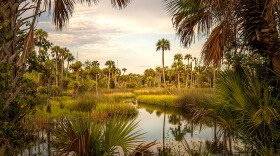-
Late last month, record-low temperatures cooled down the waters of the Gulf and the Atlantic significantly, causing almost 800 sea turtles to wash ashore across Florida's beaches.
-
The Everglades seldom benefit from invasive species. But now, as non-native apple snails disappear, the endangered Everglades bird, the snail kite, is paying the price.
-
Several bills coursing through Tallahassee have aroused the ire of many conservationists. But some bills also have their backing.
-
Millions still needed for cleanup as EPA moves toward first phase of work
-
The Environmental Protection Agency's Gulf Program has awarded a $750,000 grant to the Pensacola and Perdido Bays Estuary Program to establish a new regional water quality monitoring collaborative with project partners: Escambia, Santa Rosa and Okaloosa Counties, the City of Orange Beach and the Poarch Band of Creek Indians.
-
Rising temperatures, increasing nutrients, and changing currents could all be factors in the algae expansion.
-
Apalachicola Bay opened Jan. 1 for a brief season lasting through the end of February. It’s the first time the bay has opened for commercial harvesting since 2020, when the Florida Fish and Wildlife Conservation Commission closed the area due to declining oyster reefs.
-
The proposed offshore driling plan would open nearly 20 million acres of the eastern Gulf to potential oil and gas activity.
-
Lawmakers are back in Tallahassee this week for their annual session. Environmentalists are concerned about bills that would reduce local government control over pollution and new developments.
-
FIORE of Pensacola owner's first documentary screens at Mountainfilm on Tour
Play Live Radio
Next Up:
0:00
0:00
Available On Air Stations










